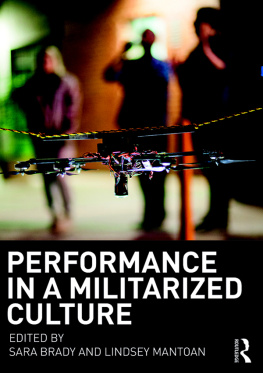Sara Brady and Lindsey Mantoan - Performance in a Militarized Culture
Here you can read online Sara Brady and Lindsey Mantoan - Performance in a Militarized Culture full text of the book (entire story) in english for free. Download pdf and epub, get meaning, cover and reviews about this ebook. year: 2017, publisher: Taylor & Francis (CAM), genre: Politics. Description of the work, (preface) as well as reviews are available. Best literature library LitArk.com created for fans of good reading and offers a wide selection of genres:
Romance novel
Science fiction
Adventure
Detective
Science
History
Home and family
Prose
Art
Politics
Computer
Non-fiction
Religion
Business
Children
Humor
Choose a favorite category and find really read worthwhile books. Enjoy immersion in the world of imagination, feel the emotions of the characters or learn something new for yourself, make an fascinating discovery.
- Book:Performance in a Militarized Culture
- Author:
- Publisher:Taylor & Francis (CAM)
- Genre:
- Year:2017
- Rating:5 / 5
- Favourites:Add to favourites
- Your mark:
- 100
- 1
- 2
- 3
- 4
- 5
Performance in a Militarized Culture: summary, description and annotation
We offer to read an annotation, description, summary or preface (depends on what the author of the book "Performance in a Militarized Culture" wrote himself). If you haven't found the necessary information about the book — write in the comments, we will try to find it.
Performance in a Militarized Culture — read online for free the complete book (whole text) full work
Below is the text of the book, divided by pages. System saving the place of the last page read, allows you to conveniently read the book "Performance in a Militarized Culture" online for free, without having to search again every time where you left off. Put a bookmark, and you can go to the page where you finished reading at any time.
Font size:
Interval:
Bookmark:
First published 2018
by Routledge
2 Park Square, Milton Park, Abingdon, Oxon OX14 4RN
and by Routledge
711 Third Avenue, New York, NY 10017
Routledge is an imprint of the Taylor & Francis Group, an informa business
2018 selection and editorial matter, Sara Brady and Lindsey Mantoan; individual chapters, the contributors
The right of Sara Brady and Lindsey Mantoan to be identified as the authors of the editorial material, and of the authors for their individual chapters, has been asserted in accordance with sections 77 and 78 of the Copyright, Designs and Patents Act 1988.
All rights reserved. No part of this book may be reprinted or reproduced or utilised in any form or by any electronic, mechanical, or other means, now known or hereafter invented, including photocopying and recording, or in any information storage or retrieval system, without permission in writing from the publishers.
Trademark notice: Product or corporate names may be trademarks or registered trademarks, and are used only for identification and explanation without intent to infringe.
British Library Cataloguing-in-Publication Data
A catalogue record for this book is available from the British Library
Library of Congress Cataloging-in-Publication Data
Names: Brady, Sara editor. | Mantoan, Lindsey editor.
Title: Performance in a militarized culture / [edited by] Sara Brady and
Lindsey Mantoan.
Description: Milton Park, Abingdon, Oxon ; New York, NY : Routledge, 2017. |
Series: Routledge advances in theatre and performance studies
Identifiers: LCCN 2016050302 | ISBN 9781138690189
(hardback) | ISBN 9781315229027 (ebook)
Subjects: LCSH: Performing artsSocial aspects. | Militarization.
Classification: LCC PN1590.S6 P47 2017 | DDC 306.4/84dc23
LC record available at https://lccn.loc.gov/2016050302
ISBN: 978-1-138-69018-9 (hbk)
ISBN: 978-1-138-74080-8 (pbk)
ISBN: 978-1-315-22902-7 (ebk)
Typeset in Bembo
by Apex CoVantage, LLC

Sarah Bay-Cheng
In his 1991 book War in the Age of Intelligent Machines , philosopher Manuel De Landa observed the ways in which military systems have changed in response to the refinement of digital technologies since World War II. Todays computerized networks, he wrote, are imposing on the military the need to decentralize control schemes, just as the conidial bullet forced it in the nineteenth century to decentralize its tactical schemes (45). As I read Sara Brady and Lindsey Mantoans anthology manuscript in the summer of 2016, it occurs to me that part of this decentralization repeats in the conscription of digitally engaged citizens throughout the world within a new kind of decentralized and technological military network. After all, many of the devices and machines that we now readily take for grantedwristwatches, microwave ovens, personal computers, mobile phones, USB file drives, digital printing, GPS, the internet, and so onbegan as military projects. Further, as the revelations of Edward Snowden made clear in 2013, even the most seemingly innocuous use of social media could be coopted by international governments as part of widespread digital surveillance. In the United States, more research funding is directed to military purposes than any other, including public health and other scientific research. According to the American Association for the Advancement of Science report on research funding for fiscal year 2013, the money spent on research for the Department of Defense (typically through DARPA, or Defense Advanced Research Projects Agency) exceeded all other agencies (e.g., National Institutes of Health, NASA, etc.) combined (AAAS). Such realities are hardly a surprise any more, but events in the summer of 2016 have made their repercussions all the more evident.
In mid-July 2016, the Dallas police responded to a sniper who was targeting officers assigned to a Black Lives Matter protest. Under the orders of the Chief of Police, David Brown, the police sent a robot equipped with explosives to the location of the shooter, killing him when the bomb detonated and likely preventing further deaths. As many news outlets remarked, it was a tactic unprecedented, but unlikely to remain unique; Chief Brown defended his choice to the media, arguing that This wasnt an ethical dilemma, for me. Id do it again to save our officers (Sidner and Simon 2016). Whatever the ethical implications, the event was a thoroughly militarized exercise. The protest was organized in response to the recent police shootings of Alton Sterling in Louisiana and Philando Castile in Minnesota. The Dallas sniper, Micah Xavier Johnson, was a former member of the US Army Reserves who had served a nine-month tour in Afghanistan. In the July 7 shooting, elements brewing throughout the summer of 2016 converged: the rise of Black Lives Matter protests in response to police assaults on Black men and women in America; the increased militarization of the US police force as recipients of surplus military technology (Apuzzo 2014); the ongoing debate regarding second-amendment access to firearms; and the return of former military personnel from ongoing wars in Afghanistan, Iraq, and other military actions targeting Daesh, or the Islamic State.
What does it mean to consider performance in such a context? In his 2001 Perform or Else , Jon McKenzie detailed connections among technological performance, military operations, and performance studies, noting the applicability of cultural performance models in understanding the decision-making processes guiding the design, construction, and evaluation of technological performances that range from consumer products to public infrastructure systems (130). Performance in a Militarized Culture continues that process, using modes of performance analysis to not only understand but also confront and perhaps resist the effects of militarization in contemporary culture. The chapters demonstrate how instrumental performance and theatricality have been to militarized cultures, both contemporary and historical. As Brady and Mantoan argue in their introduction, performance is and has to be understood as key to the militarization of culture we experience every day. Their collective implication may be even darker, as they highlight the transformation of citizens into surveillance subjects and the weapons that haunt our social interactions like Hamlets ghost, spurring us to aggression.
In 1991 De Landa suggested that computer technologies, particularly artificial intelligence (AI), shift cognitive processes from humans to machines and thereby alter the logic and processes of warfare. For the past decade (longer?), researchers developing AI increasingly have relied on crowdsourcing to improve its functioning. Their methods often draw on integrations of social media and consumer shopping, as for example, Amazons Alexa, which combines the AI personal assistant with the websites vast array of products (Simonite 2012). (This was, at least in part, the dystopian future depicted in Alex Gardners 2014 film Ex Machina .) If De Landa and Snowden are correct, then one has to conclude that widespread global participation in otherwise banal online activities fuels and enhances digital, militarized culture as collective thinking shifts from individual processing to algorithms and digital predictors. In other words, we may be friending and shopping our way to the next generation of thinking military machines, even as we outsource much of our individual decision-making. Recalling recent events during the extraordinarily hot summer of 2016, I am reminded of Nietzsches warning that, when you stare for a long time into an abyss, the abyss stares back into you ([1886] 2002:69). In such a context, what is our relation to the thinking, warring machines around us, and how much of their intelligence have we absorbed? Mantoan and Bradys valuable anthology may not provide easy answers or reassurances, but they draw our attention back to performance as a mode for thinking and performing through our militarized, contemporary culture.
Font size:
Interval:
Bookmark:
Similar books «Performance in a Militarized Culture»
Look at similar books to Performance in a Militarized Culture. We have selected literature similar in name and meaning in the hope of providing readers with more options to find new, interesting, not yet read works.
Discussion, reviews of the book Performance in a Militarized Culture and just readers' own opinions. Leave your comments, write what you think about the work, its meaning or the main characters. Specify what exactly you liked and what you didn't like, and why you think so.










